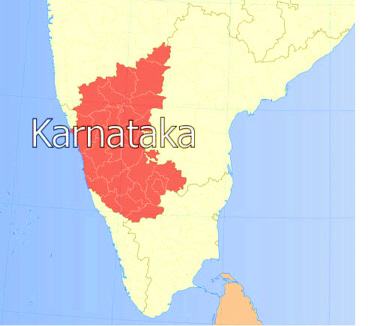
(Bildquelle: PlaneMad/Wikipedia. -- CC-by-sa)

(Bildquelle: PlaneMad/Wikipedia. -- CC-by-sa)
Zitierweise / cite as:
Hodson, Thomas: An elementary grammar of the Kannada, or Canarese language. -- 15. The irregular verbs ಅನ್ನು annu, or ಎನ್ನು ennu, say; and ತಿನ್ನು tinnu, eat (§ 119). -- Fassung vom 2011-08-25. -- URL: http://www.payer.de/hodson/hodson15.htm
First published as: Hodson, Thomas: An elementary grammar of the Kannada, or Canarese language ; in which every word used in the examples is translated, and the pronunciation is given in English characters. -- 2. ed. -- Bangalore : Wesleyan Mission Press, 1864. -- 128 p. ; 23 cm.
First time published here: 2011-08-25
Revisions:
©opyright: Public domain
This text is part of the section Sanskrit und Indien of Tüpfli's Global Village Library
If you don't get the diacritics displayed, install a Unicode font like Tahoma.
The verbs ಅನ್ನು annu, or ಎನ್ನು ennu, say; and ತಿನ್ನು tinnu, eat, are conjugated as follows. The Tenses not given below are formed according to rule.
Root ಅನ್ನು annu, say. See §§ 284 - 290.
| Past ಭೂತ bhūta |
ಅಂದು aṃdu | having said | Root + ದು du |
| Present & Future ವರ್ತಮಾನ & ಭವಿಷ್ಯತ್ತು vartamāna & bhaviṣyattu |
ಅನ್ನುವ
annuva ಅಂಬ |
who or which says, or will say | Root + ಉವ
uva Irregular |
| Past ಭೂತ bhūta |
ಅಂದ aṃda | who or which said | Irregular |
This tense is regularly formed; but, in addition, the word
ಅಂತೆ aṃte, they say, it is said, &c.
is of very common use.
I, &c. said.
Irregular Past relative participle ಅಂದು aṃdu + personal affixes.
| Person ಪುರುಷ puruṣa |
Singular ಎಕವಚನ ekavacana |
Plural ಬಹುವಚನ bahuvacana |
|
| 1st. ಉತ್ತಮ್ uttama |
ಅಂದೆನು aṃdenu |
ಅಂದೆವು aṃdevu |
|
| 2nd. ಮಧ್ಯಮ madhyama |
ಅಂದಿ aṃdi
ಅಂದೆ |
ಅಂದಿರಿ aṃdiri |
|
| 3rd. ಪ್ರಥಮ prathama |
masculine |
ಅಂದನು aṃdanu |
ಅಂದರು aṃdaru |
| feminine |
ಅಂದಳು aṃdaḷu |
ಅಂದರು aṃdaru |
|
| neuter |
ಅಂದಿತು aṃditu |
ಅಂದವು aṃdavu |
I, &c. shall or will say.
This tense may be regularly formed by adding the usual personal affixes to the regular future relative participple, ಅನ್ನುವ annuva. Thus
| Person ಪುರುಷ puruṣa |
Singular ಎಕವಚನ ekavacana |
Plural ಬಹುವಚನ bahuvacana |
| 1st. ಉತ್ತಮ್ uttama |
ಅನ್ನುವೆನು annuvenu |
ಅನ್ನುವೆವು annuvevu |
| 2nd. ಮಧ್ಯಮ madhyama |
ಅನ್ನುವಿ annuvi |
ಅನ್ನುವಿರಿ annuviri |
| &c. &c. | ||
Or by adding the same affixes to the irregular future relative paticiple ಅಂಬ aṃba. Thus:
| Person ಪುರುಷ puruṣa |
Singular ಎಕವಚನ ekavacana |
Plural ಬಹುವಚನ bahuvacana |
|
| 1st. ಉತ್ತಮ್ uttama |
ಅಂಬೆನು aṃbenu |
ಅಂಬೆವು aṃbevu |
|
| 2nd. ಮಧ್ಯಮ madhyama |
ಅಂಬಿ aṃbi |
ಅಂಬಿರಿ aṃbiri |
|
| 3rd. ಪ್ರಥಮ prathama |
masculine |
ಅಂಬನು aṃbanu |
ಅಂಬರು aṃbaru |
| feminine |
ಅಂಬಳು aṃbaḷu |
ಅಂಬರು aṃbaru |
|
| neuter |
ಅಂಬದು aṃbadu |
ಅಂಬವು aṃbavu |
I, &c. shall perhaps say.
Iregular past gerund ಅಂದು aṃdu + personal affixes.
| Person ಪುರುಷ puruṣa |
Singular ಎಕವಚನ ekavacana |
Plural ಬಹುವಚನ bahuvacana |
|
| 1st. ಉತ್ತಮ್ uttama |
ಅಂದೇನು aṃdēnu |
ಅಂದೇವು aṃdēvu |
|
| 2nd. ಮಧ್ಯಮ madhyama |
ಅಂದೀಯೆ aṃdīye |
ಅಂದೀರಿ aṃdīri |
|
| 3rd. ಪ್ರಥಮ prathama |
masculine |
ಅಂದಾನು aṃdānu |
ಅಂದಾರು aṃdāru |
| feminine |
ಅಂದಾಳು aṃdāḷu |
ಅಂದಾರು aṃdāru |
|
| neuter |
ಅಂದೀತು aṃdītu |
ಅಂದಾವು aṃdāvu |
To 16. The Irregular Verbs ಬರು baru, come, and ತರು taru, bring (§ 120)